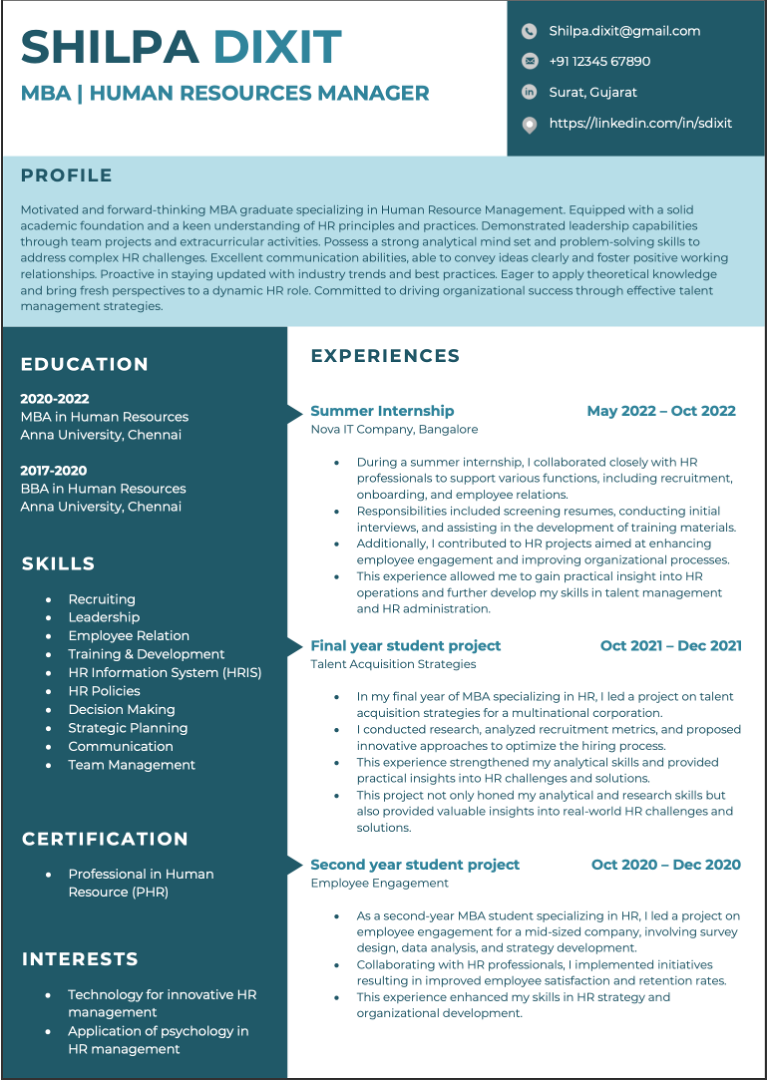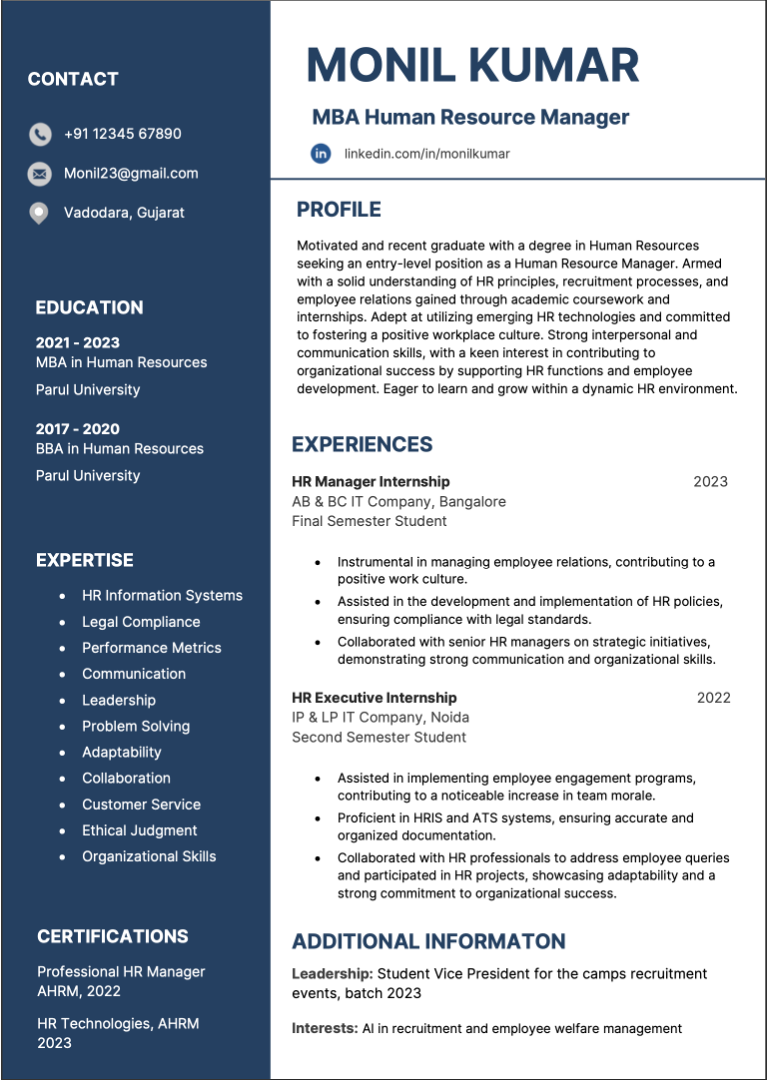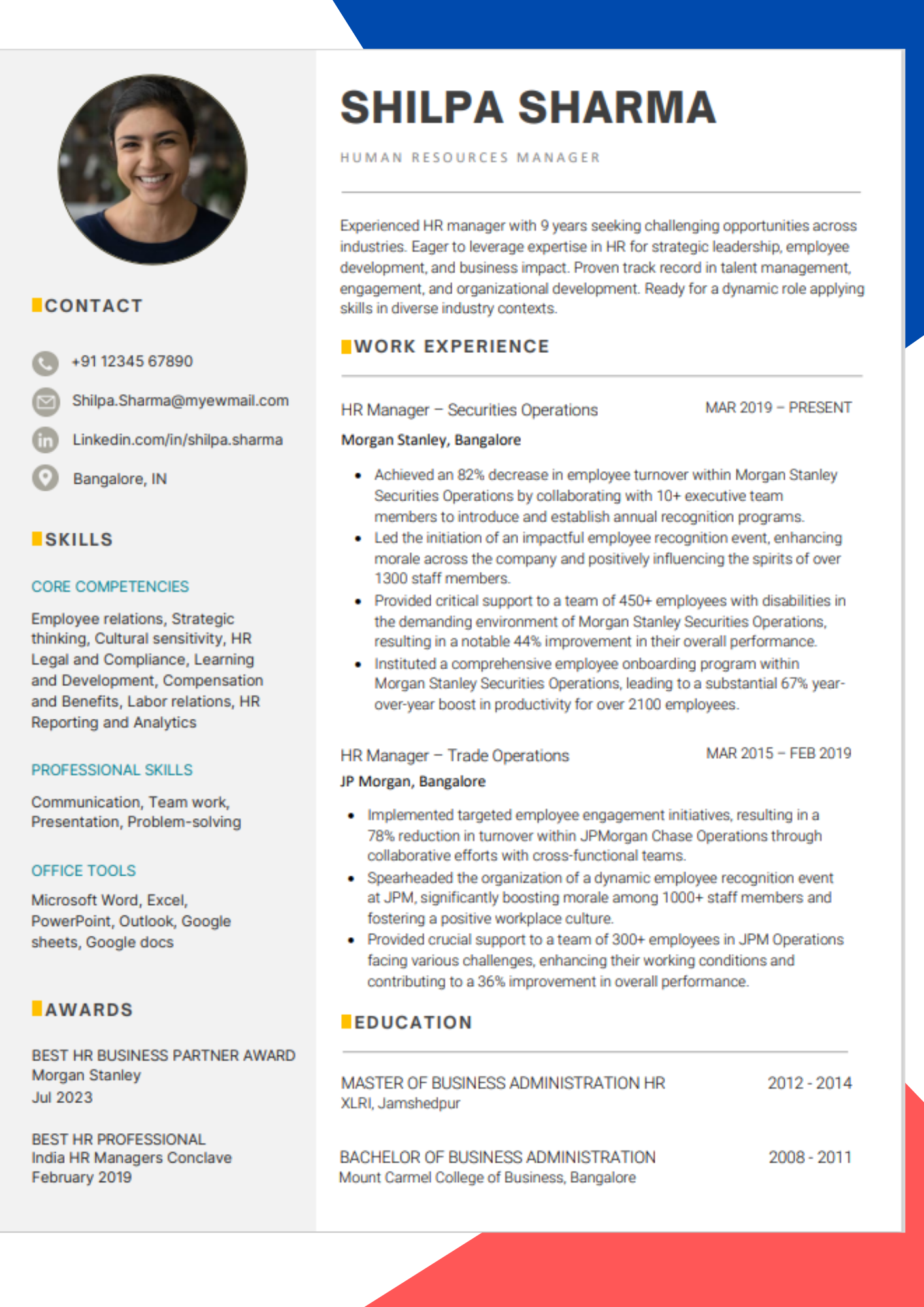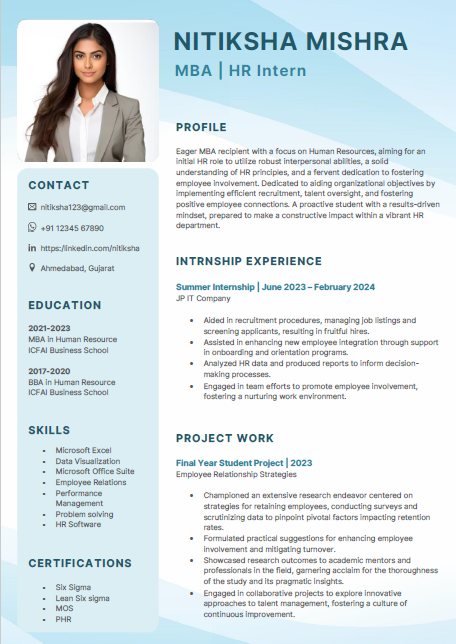Modern Resume
MS Word MBA HR Fresher Example Resume
MBA HR Fresher Example
MBAhr1

Objective
Motivated and forward-thinking MBA graduate specializing in Human Resource Management. Equipped with a solid academic foundation and a keen understanding of HR principles and practices. Demonstrated leadership capabilities through team projects and extracurricular activities. Possess a strong analytical mind set and problem-solving skills to address complex HR challenges. Excellent communication abilities, able to convey ideas clearly and foster positive working relationships. Proactive in staying updated with industry trends and best practices. Eager to apply theoretical knowledge and bring fresh perspectives to a dynamic HR role. Committed to driving organizational success through effective talent management strategies.
Education
MBA - Human Resources Management, BBA with specialization in HR
Skills
• Recruiting
• Leadership
• Employee Relation
• Training & Development
• HR Information System (HRIS)
• HR Policies
• Decision Making
• Strategic Planning
• Communication
• Team Management
Most important soft skills on a HR Resume
Soft skills play a crucial role in the HR profession, and employers often look for candidates with a strong combination of interpersonal, communication, and organizational abilities. For fresh MBA graduates in HR, here are some of the most sought-after soft skills:
Communication Skills:
Description: The ability to communicate effectively is vital in HR roles. This includes written and verbal communication, active listening, and the capability to convey information clearly and empathetically.
Importance: HR professionals frequently interact with employees, managers, and external stakeholders. Clear communication helps in understanding needs, resolving conflicts, and fostering positive relationships.
Empathy:
Description: Empathy involves understanding and sharing the feelings of others. In HR, it's essential for relating to employees' concerns, providing support, and addressing issues with sensitivity.
Importance: An empathetic approach contributes to a positive workplace culture and helps HR professionals connect with employees on a personal level, fostering trust and collaboration.
Conflict Resolution:
Description: The ability to manage and resolve conflicts is crucial in HR. This involves mediating disputes, finding common ground, and implementing strategies to prevent future conflicts.
Importance: HR professionals often deal with employee grievances and interpersonal issues. Effective conflict resolution contributes to a harmonious work environment.
Adaptability:
Description: Adaptability is the capability to adjust to new situations, changes, and challenges. In HR, it involves being flexible in response to evolving organizational needs and industry trends.
Importance: The business environment is dynamic, and HR professionals need to adapt to changes in policies, technology, and organizational structures.
Teamwork and Collaboration:
Description: HR professionals frequently work with various departments and teams. Being able to collaborate effectively is essential for successful project management and achieving organizational goals.
Importance: HR often plays a central role in fostering teamwork and collaboration across different functions. Strong collaboration skills contribute to successful HR initiatives.
Time Management:
Description: Time management involves prioritizing tasks, meeting deadlines, and efficiently allocating time to various responsibilities.
Importance: HR professionals juggle multiple responsibilities, from recruitment to employee relations. Effective time management ensures that tasks are completed efficiently and on schedule.
Problem-Solving Skills:
Description: Problem-solving involves analyzing issues, developing solutions, and implementing effective strategies. HR professionals need to address challenges related to employee relations, policy implementation, and organizational development.
Importance: The ability to solve problems contributes to a proactive and strategic HR approach, fostering a positive and efficient workplace.
Negotiation Skills:
Description: Negotiation skills are essential in HR for activities such as contract discussions, resolving conflicts, and managing compensation and benefits.
Importance: Effective negotiation helps HR professionals find mutually beneficial solutions, whether it's during recruitment, performance discussions, or other HR processes.
Ethical Judgment:
Description: Ethical judgment involves making decisions based on principles of fairness, integrity, and legality. HR professionals often deal with confidential information and ethical dilemmas.
Importance: Upholding ethical standards is crucial in HR to build trust among employees, maintain compliance, and protect the organization's reputation.
Influencing Skills:
Description: Influencing skills involve the ability to persuade and guide others toward a particular course of action. HR professionals may need to influence decisions related to policies, employee engagement, or organizational change.
Importance: Being able to influence others positively contributes to the successful implementation of HR initiatives and the development of a positive workplace culture.
These soft skills complement the technical knowledge gained during an MBA in HR and contribute to the overall effectiveness of HR professionals in managing people and promoting a healthy organizational environment.
When showcasing these skills on a resume or during interviews, providing specific examples from coursework, internships, or other experiences can strengthen the candidate's profile.
Interests/Hobbies
• Technology for innovative HR management • Application of psychology in HR management
Tips to include relevant interests on your resume
Including interests related to "Technology for innovative HR management" and the "Application of psychology in HR management" on an MBA HR resume can greatly appeal to potential employers for the following reasons:
Technology for Innovative HR Management:
Technological Advancements in HR: Demonstrates a proactive interest in staying abreast of technological trends within the HR field. Employers value candidates who are tech-savvy, as technology plays an increasingly crucial role in HR functions, such as recruitment, talent management, and employee engagement.
Efficiency and Process Improvement: Indicates a focus on improving HR processes through technology. This interest suggests that the candidate is not only aware of the latest HR technologies but is also enthusiastic about leveraging them to enhance efficiency, data analytics, and overall HR management.
Strategic Perspective: Implies a strategic mindset by recognizing the strategic importance of technology in shaping HR strategies. Employers seek candidates who can align HR practices with organizational goals, and a tech-focused interest signals a forward-thinking approach.
Adaptability: Reflects an openness to embrace change and adapt to new tools and systems. In a rapidly evolving business environment, HR professionals need to be adaptable, and an interest in technology signals a readiness to embrace and implement innovative solutions.
Application of Psychology in HR Management:
Understanding Employee Behavior: Signals a deep interest in understanding human behavior, a critical aspect of HR. This interest suggests that the candidate recognizes the importance of psychology in addressing employee motivations, engagement, and workplace dynamics.
Employee Well-being: Demonstrates a concern for employee well-being and job satisfaction. Employers appreciate HR professionals who understand the psychological aspects of the workplace and can contribute to fostering a positive and healthy work environment.
Effective Communication and Conflict Resolution: Psychology plays a crucial role in effective communication and conflict resolution, key skills in HR. Interest in this area suggests a commitment to developing skills related to employee communication, interpersonal relations, and conflict management.
Talent Development: Indicates an understanding of how psychological principles can be applied to talent development and employee training. Employers seek HR professionals who can contribute to the personal and professional growth of employees.
Strategic Decision-Making: Suggests an interest in making informed, psychologically grounded decisions. This can be particularly valuable in areas such as talent acquisition, performance management, and organizational development.
In summary, these interests contribute to a well-rounded and forward-thinking profile. They show potential employers that the candidate is not only knowledgeable about traditional HR practices but is also eager to incorporate technology for efficiency and is cognizant of the psychological aspects influencing employee management, engagement, and organizational success. Both of these interests align with the evolving nature of HR roles and indicate a commitment to continuous learning and improvement.
Additional Inputs
Difference between Interests and Hobbies in resume
While both interests and hobbies provide insights into an individual's personality, they have subtle differences from a resume point of view:
Relevance to the Job:
Interests: Typically, interests on a resume refer to activities or topics that are related to the professional field or industry. They may include professional memberships, industry conferences attended, or relevant publications read.
Interests are often tailored to demonstrate a candidate's commitment to staying informed and engaged in their field.
Hobbies: Hobbies are more personal and can include a broader range of activities that may not necessarily have a direct connection to the job. They reflect activities pursued for personal enjoyment and relaxation, which may not directly relate to the professional context.
Professional Development vs. Personal Enjoyment:
Interests: Usually focus on activities that contribute to professional development, networking, and industry knowledge. For example, an interest in attending workshops or staying updated on industry trends.
Hobbies: Tend to be activities pursued for personal enjoyment and relaxation, providing a glimpse into the candidate's life beyond the professional realm. Examples could include painting, hiking, or playing a musical instrument.
Networking Opportunities:
Interests: Often involve activities that can provide networking opportunities within the professional community. Attending industry conferences, participating in webinars, or being a member of professional associations are examples of interests.
Hobbies: While hobbies may not directly contribute to professional networking, they can still provide conversation topics during interviews or workplace interactions, helping to establish rapport with colleagues.
Demonstration of Skills:
Interests: Showcase skills that are directly applicable to the job or industry. For instance, an interest in data analysis tools, programming languages, or specific industry-related certifications.
Hobbies: May demonstrate a broader set of skills that can be transferable but might not be directly related to the job. For example, hobbies such as woodworking, photography, or cooking could showcase creativity, attention to detail, or patience.
Tailoring for the Job:
Interests: Often tailored to align with the specific requirements of the job or industry. For instance, if applying for a marketing role, the candidate might express an interest in digital marketing trends or SEO strategies.
Hobbies: While hobbies can be included on a resume, they are usually presented in a more general manner. For example, a candidate might mention a passion for photography without necessarily tying it directly to the job.
In summary, interests on a resume often lean toward professional development and industry engagement, while hobbies provide a more personal and holistic view of the candidate. The choice between including interests or hobbies depends on the job, industry norms, and the overall image the candidate wishes to portray.


